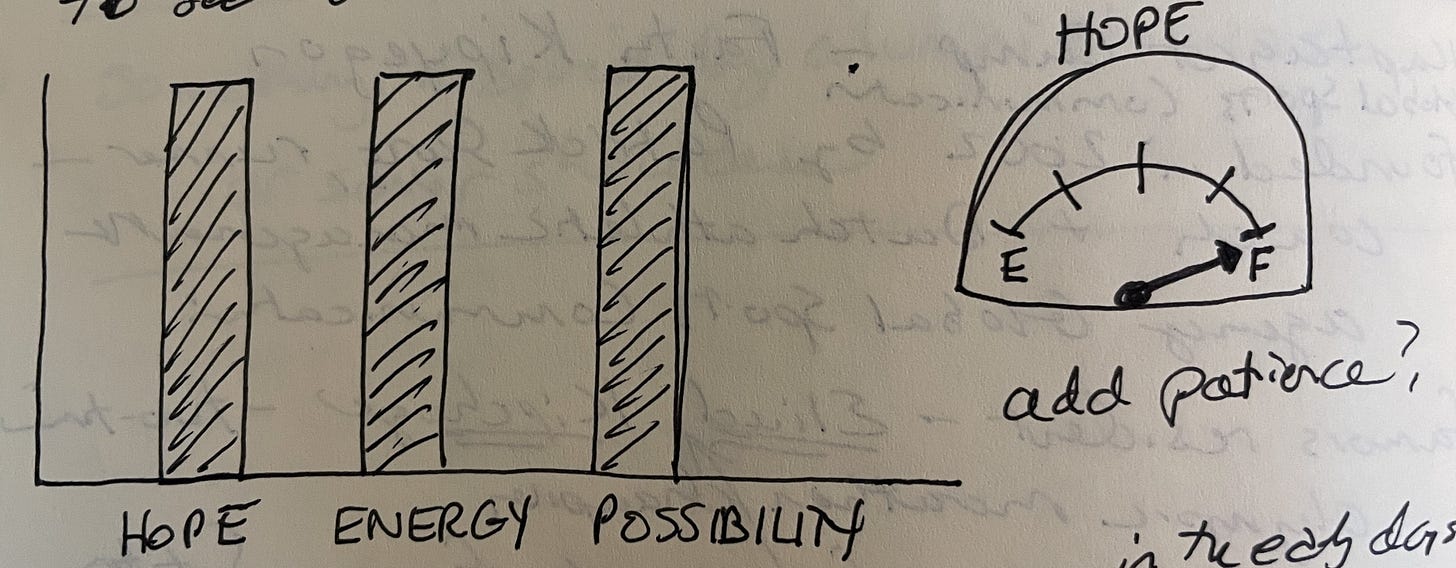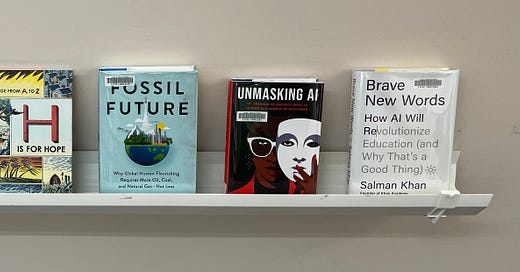The August Reset
Hope, energy, and possibility as the first day of school glimmers on the horizon
Monday, Aug. 19, is the first day of school. This week, freshmen arrived for orientation, their energy pulsing through the halls.
Around the same time, a Primetime in Paris broadcast included a story about Faith Kipyegon, a now three-time Olympic gold medalist in the 1500-meter race, a story that gave viewers a glimpse of the special camp where she lives five days per week to train with other elite Kenyan distance runners. In an interview, Eliud Kipchoge, the marathon champion who runs the center, referenced a sign posted there that reads, “A community is a group of people who agrees to grow together.”
On our best days, this is the definition of community that we live into at my high school, a commitment at its most tangible as the school year opens like the segments of a freshly peeled clementine, its scent full of promised sweetness.
This past Monday, I woke well before my alarm, eager to meet our newest Dragons—the shy ones, the bold ones, and all those in between. I’ve been at this long enough not to be naïve. I know that a few will push my buttons before Labor Day. Yet I also know that many more will make me glad to wake up and get to school to see what we can learn from each other.
This annual reset button that was once the day after Labor Day and is now two weeks earlier, is one of my favorite gifts of teaching. As the students’ first day approaches, there’s a conviction that renews inside my colleagues and me that this year, this year, we will… [fill in the blank with a desired goal]. Hope, energy, and possibility are at their peak. As I was drafting this post, I sketched the feeling like this:

Sometimes there’s enough oxygen and sufficient reprieve from strong winds for the glowing embers to ignite soon after a goal is set—whether it’s a new lesson, project, program, course, or event. At other times, it may take decades for favorable conditions to emerge for its flourishing.
A change that I’ve imagined for almost two decades—since midway through my first year—is happening this fall. I’ve wanted our freshman course that equips students with fundamental skills and habits for success in high school and beyond to be redesigned so that all students learn key academic skills during their first few weeks on campus. Since the course’s inception (well before I began teaching here), students have rotated through a different subject each quarter: Speech, Statistics, Social Studies, and Science. This meant that skills taught in a particular rotation, such as the Cornell note-taking method in Social Studies, were learned in September by some students, and not until April for others.
I’m far from the only one who’s imagined this possibility. Over the years, I’ve served on three committees that considered this idea—and there were several others that did so before I got involved. Even though we retained the four-subject structure each time, the possibility of a different approach persisted like a fire that smolders deep beneath layers of peat.
Then last fall, as I helped facilitate the latest exploration of whether to adjust the course, a major shift occurred. Our science team decided they could teach the skills they wished to impart to freshmen through Biology instead of in this separate course. Suddenly, like a magical room that appears out of nowhere, space opened for the change many of us had envisioned. With the question of available time answered, we found that we largely agreed on which skills and awarenesses to emphasize in this new rotation. A plan coalesced quickly.
The speed with which a concrete plan for this new rotation emerged surprised us. Surprise. It’s an essential component of the feeling that imbues this time of the school year. How might students surprise us this year? How might we surprise ourselves?
Another component of that feeling this fall is an urgent desire to see long-awaited changes succeed. Yet, none of us can make that happen solo, no matter how many hours we work. I’m part of a trio of faculty who developed lesson plans and materials for the new Foundations module. Seven different teachers will now use those resources to guide students. To create the new rotations in students’ schedules and in the teachers’ gradebooks, the Co-Director of Counseling brought her expertise to the table. She also relabeled the course with its new name. Our technology team is monitoring the course’s functionality in our learning management system and assisting with tech-focused lessons.
And then there’s our administrative team. Not only did they approve the staffing needed to allow all freshmen to take the Foundations rotation at the same time (which also slightly lowered the student-to-teacher ratio), but they also played an essential role in communicating these changes to parents. All in all, at least 20 staff are involved in making the Foundations portion of the course a reality. We expect to encounter some bumps during this pilot year—and are experiencing some now—yet we're hopeful that we can absorb those bumps together and produce noticeable benefits for the Class of 2028.
If you’re an educator, or maybe even if you’re not, you might be wondering what the Science team gained by surrendering their spot in that freshman course. Their biggest gain was time—time to offer more courses in response to students’ interests. Along with existing non-core courses: Biopsychology, Anatomy, AP Environmental Science, Intro to Organic Chemistry, and a senior seminar called Wilderness and the American Mind, the Science team is teaching two new electives in 2024-2025: Auto Engineering and Becoming a Naturalist. It’s a good time to be a Dragon.
A fresh calendar hangs on the wall above my standing desk, another marker of the new year. It’s already filling up with lessons, meetings, and events. I’ve scheduled our kickoff Transcribe-a-thon with the Library of Virginia and my first meeting with the 2024-2025 One Small Step organizing team. Thanks to a retired friend who came in last week to help me cover books, several are on display in sections of rain gutter attached to the walls, and on the windowsills and book return cabinet.

The question on the library’s chalkboard wall asks, “What events did you enjoy watching at the 2024 Paris Olympics?” As I posed the question, I pictured Faith Kipyegon and that sign at her training center: “A community is a group of people who agrees to grow together.”
I can’t speak for my colleagues, but I’ve already learned a lot as we’ve worked on bringing these changes to fruition. I’m also excited about a new subcommittee I’m co-chairing with our engineering teacher: Generative AI. In fact, my mind’s been so eager to keep imagining, questioning, and problem-solving, that I’m having trouble staying asleep. I realize I can’t bring my best self to teaching if I have too many four-hour nights, so I’ll need to figure out ways to quiet my brain. But the energy is like that sizzle and flash during a lightning storm. It’s hard to look away.
I can’t wait for Monday…
Here’s a poem for your pocket until the next post. Rather than text, this is a video of me reading a not-yet published poem I wrote on our second day back on campus in 2021 after we’d spent a year teaching students on Zoom: “On the Second Day.”




Okay, now I’m excited for classes to start!
I have no doubt that you'll have a wonderfull year with your incredibly lucky students! Enjoy it!
Your writing (musings) always amaze and engage me. This one takes me back to memories.of the (too infrequent - but still powerful and life changing momenys I had when educators like you.said or did just whay I needed at that time. I can't thank you and your kindred colleagues enough for how your wisdom, care, compassion and understanding makes not only fulfilling lives possibe for your students - but the seemingly unreachable - possible. You are a treasure!
Please never undersetimate what you do for your students - or for our world.
Thank you for being you from the bottom of my heart.